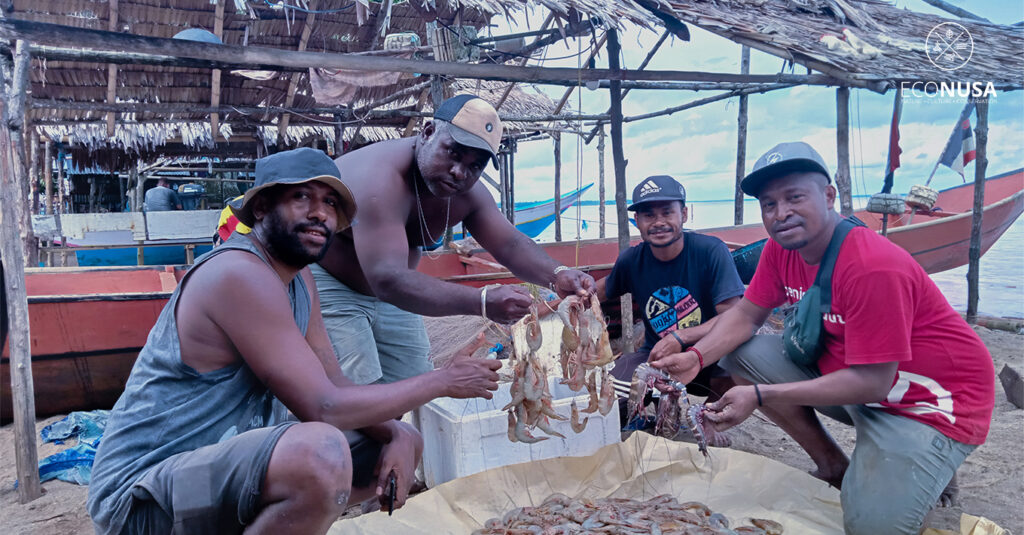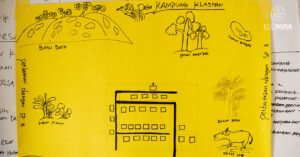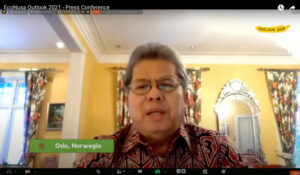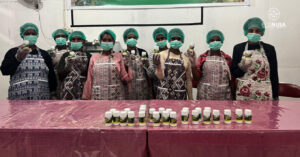
Waimon Island is one of villages in Segun District that is geographically located on the southern of Sorong Regency, West Papua. Waimon Village is populated by some clans, namely Aresi, Fadan, Malalu, Kasilit, Igip, and Seme. One of the valuable assets they have is Bambu Island. The island here has promising potentials particularly in Segun District since the island serves as the center of collection of banana shrimp (Fenneropenaeus merguiensis).
Unfortunately, it is not the local community that dominates the utilization of seafoods in Bambu Island. In fact, most fishermen in the island come from Buton Tribe of Southeast Sulawesi. Rumor says that they have attained a Rp50,000,000 worth contract agreement value in Bambu Island per year. The existing contract since 2003 was between the Malalu clan and the collectors or middleman. The contract for marine commodity utilization here is considered very profitable. One of the potentials with stable supply is the banana shrimp commodity.
Read Also: Quit Bombing Fish
In one daily trip, an armada operated by 2-3 fishers could catch around 80 – 100 kilograms. Banana shrimp cost Rp60,000 per kilogram at the middleman. Then they sell the shrimp at Rp80,000 to Rp100,000 per kilogram in town.
It implies that an armada of fishers could earn around Rp4,800,000 – Rp6,000,000 gross income per day. If in a day 80 fishers armada operated, the yearly contract amount could be paid off by that one day trip.
Based on the recorded armada, the fishermen use net as their fishing tools. The net here normally is 20 meters long. But to maximize the results, the locals usually stitch several nets to create 200 meters long net.
Read Also: Only Few Aware of Climate Crisis Despite Looming Threat
There are two ways to catch shrimp. First, the fisherman would let the catching area undisturbed a day long. On the next day, the net is set up for about 2-3 hours while monitoring the floating tool of the net. When the floating tool moves, it is the sign to pull up the net.
The second way is by setting up the net on half circle shape for more or less 15 minutes. After that, the fishermen will throw a stone or bello (a small-long wood stick) and beat the water to herd the shrimp into the net.
According to Lekius Kasilit, a Waimon villager, the collectors only employ few local workers. They mostly employ contract workers from Buton. Currentlly, there are two collectors operating in Waimon areas, namely in Segun Bay and Bambu Island.
“We only catch shrimp in Bambu Island surrounding areas and take the catches to the collectors. Usually, we took some stuffs like gasoline, sugar, coffee, cigarette, betel nut, and biscuits from the collectors. We took them then pay only after we bring the catches to the collector. The shrimp we catch should be cleaned and remove the heads for ensuring the nett weight. The total sales will be deducted by the cost of items we had taken before,” said Lekius.
Read Also: Thousand Youngsters Performing Aksi Muda Jaga Iklim as Youth Pledge Manifesto
Considering the condition, the Waimon people intends that the management of Bambu Island is returned to the local community. They do not want any collectors to run business because they have harmed them for about 21 years.
The migrants residing in Bambu Island have administrative data and been registered as the people of Waimon Village. However, despite dwelling as villagers, they have never given any physical or financial contribution to Waimon Village.
The management of marine commodities in Bambu Island should have adopted sustainable model that sides with the indigenous peoples. It requires further discussion involving local figures and encourage locals’ capacities. A Village Regulation (Perkam) concerning the existence of Village-owned Enterprise (BumKam) to administer coastal areas of Waimon Village should also be drafted. This way, fishing activities are controlled, and shrimp resources are sustainable.
Editor: Leo Wahyudi dan Lutfy Putra







